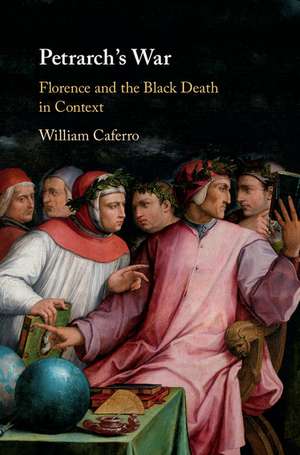Petrarch's War: Florence and the Black Death in Context
Autor William Caferroen Limba Engleză Hardback – 2 mai 2018
| Toate formatele și edițiile | Preț | Express |
|---|---|---|
| Paperback (1) | 282.48 lei 43-57 zile | |
| Cambridge University Press – 4 mar 2020 | 282.48 lei 43-57 zile | |
| Hardback (1) | 692.16 lei 43-57 zile | |
| Cambridge University Press – 2 mai 2018 | 692.16 lei 43-57 zile |
Preț: 692.16 lei
Preț vechi: 777.70 lei
-11% Nou
Puncte Express: 1038
Preț estimativ în valută:
132.44€ • 138.65$ • 109.59£
132.44€ • 138.65$ • 109.59£
Carte tipărită la comandă
Livrare economică 07-21 aprilie
Preluare comenzi: 021 569.72.76
Specificații
ISBN-13: 9781108424011
ISBN-10: 1108424015
Pagini: 238
Dimensiuni: 158 x 235 x 17 mm
Greutate: 0.47 kg
Editura: Cambridge University Press
Colecția Cambridge University Press
Locul publicării:Cambridge, United Kingdom
ISBN-10: 1108424015
Pagini: 238
Dimensiuni: 158 x 235 x 17 mm
Greutate: 0.47 kg
Editura: Cambridge University Press
Colecția Cambridge University Press
Locul publicării:Cambridge, United Kingdom
Cuprins
Introduction: plague in context: Florence 1349–50; 1. Petrarch's war; 2. The practice of war and the Florentine army; 3. Economy of war at a time of plague; 4. Plague, soldiers' wages, and the Florentine public workforce; 5. The bell ringer travels to Avignon, the cook goes to Hungary: towards an understanding of the Florentine labor force, 1349–50; Epilogue: why two years matter (and the short-term is not inconsistent with the long-term).
Recenzii
'In Petrarch's War, William Caferro magisterially opens a window onto the complexities and unintended consequences of past lived experience, enlisting economic, military, literary, and social history into a densely contextualized snapshot of Florence in the aftermath of the Black Death. In this important book Caferro shows us how the war waged by Florence against the Ubaldini clan in 1349–50 is an integral part of a cultural mosaic that encompasses tesserae as diverse as soldiers' wages and the power plays of intellectuals.' Teodolinda Barolini, Columbia University, New York
'Once again, William Caferro has produced a first-rate book. Based on vigorous and meticulous archival digging, shaped by his acute intelligence, and drawing on his sympathetic but not uncritical knowledge of the existing historiography, Caferro has produced a highly original interpretation of mid-fourteenth-century Florentine history. Cutting through compartmentalized subjects that are often examined in isolation from each other … Caferro has fashioned an analytical narrative that is bound to attract the attention of all scholars of late medieval and early modern Europe … William Caferro can now rightfully claim a place among the most original and productive historians of his generation.' Anthony Molho, European University Institute, Florence
'A strikingly original study that mixes military history, economic history, and literary analysis, Petrarch's War will interest historians across fields and disciplines. Specialists of Renaissance Florence will contend with something new. Anyone grappling with questions of method will find it thought-provoking.' Francesca Trivellato, Yale University, Connecticut
'History is a story that relies on details and imagination. This microhistory is an excellent example of this approach; it sheds new light on three critical years in mid-14th-century Florence: 1348, 1349, and 1350. Readers learn new facets of Petrarch's and Boccaccio's roles in the war with the Ubaldini clan and with each other. Exploration and analysis of archival sources reveal the scope of the Florentine army and its expenses, pay grades, and civilian support. … An exciting read that will force numerous reassessments of the historical art. Highly recommended.' S. Bowman, Choice
'… Petrarch's War is an excellent study … the work is absorbing and excellently argued; there is something to learn in every chapter and the historiographic conclusions are worth contemplating at length for anyone interested in our use and study of the past.' Adam Franklin-Lyons, H-Net Reviews
'Once again, William Caferro has produced a first-rate book. Based on vigorous and meticulous archival digging, shaped by his acute intelligence, and drawing on his sympathetic but not uncritical knowledge of the existing historiography, Caferro has produced a highly original interpretation of mid-fourteenth-century Florentine history. Cutting through compartmentalized subjects that are often examined in isolation from each other … Caferro has fashioned an analytical narrative that is bound to attract the attention of all scholars of late medieval and early modern Europe … William Caferro can now rightfully claim a place among the most original and productive historians of his generation.' Anthony Molho, European University Institute, Florence
'A strikingly original study that mixes military history, economic history, and literary analysis, Petrarch's War will interest historians across fields and disciplines. Specialists of Renaissance Florence will contend with something new. Anyone grappling with questions of method will find it thought-provoking.' Francesca Trivellato, Yale University, Connecticut
'History is a story that relies on details and imagination. This microhistory is an excellent example of this approach; it sheds new light on three critical years in mid-14th-century Florence: 1348, 1349, and 1350. Readers learn new facets of Petrarch's and Boccaccio's roles in the war with the Ubaldini clan and with each other. Exploration and analysis of archival sources reveal the scope of the Florentine army and its expenses, pay grades, and civilian support. … An exciting read that will force numerous reassessments of the historical art. Highly recommended.' S. Bowman, Choice
'… Petrarch's War is an excellent study … the work is absorbing and excellently argued; there is something to learn in every chapter and the historiographic conclusions are worth contemplating at length for anyone interested in our use and study of the past.' Adam Franklin-Lyons, H-Net Reviews
Notă biografică
Descriere
A compelling and revisionist account of Florence's economic, literary and social history in the immediate aftermath of the Black Death.
